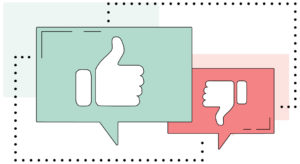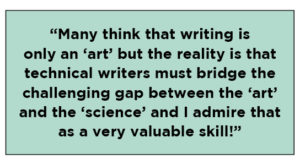by Saul Carliner | STC Fellow and Yuan Chen

Have technical communicators contributed to a positive work environment or made life more frustrating for the customers of technical communication (the internal or external groups that pay for technical communication services)?
This article offers some insights. It specifically describes the best and worst experiences that customers of technical communication have experienced, as well as whether these customers would choose to continue working with technical communicators.
The Best Experience Working with a Technical Communicator
Participants described a variety of positive experiences working with technical communicators. The most common response focused on the ways that technical communicators added value to the communication efforts of their organizations. Nine of 33 participants noted this.
Participants specifically lauded the ability of technical communicators to align material to specific audiences and provide those audiences with “important details.” Another noted that an earlier version of their “user guide was a very confusing document that was not up to date. A technical writer worked with development, product management, and QA and updated the guide. The changes were great.”
Others described collaborative experiences that led to particularly effective communication materials. For example, one participant commented that “although we had a short time frame to produce the user guide… it was a very smooth process. Our tech writer was able to incorporate clear instructions to the target user. It was a fast and great experience all around.”
Another added that the relationship had “the sense of cooperation, driven by a mutual commitment to ensure that our product documentation was as accurate, clear, and comprehensible as possible.”
The second most common response focused on the role that technical communicators play in strengthening work processes and making them more efficient, something noted by seven of 33 participants. Sometimes, that involves preparing resources so that customers can produce materials on their own, such as “templates/forms that made it easier for me to write” and “doing more than just reviewing my document for typos/formatting.” Another focused on the independence of technical communicators, commenting that theirs “could sit down at a system and document their experience with minimal hand holding.”
One participant noted the role that technical communicators played in successfully working with offshore partners. “This started as a challenge, but our internal team did a great job of screening candidates and training new hires, so now we’ve had a very strong group in India . . . preparing materials for our largely North American audience.”
The third most common response focused on the role technical communicators play in addressing surface communication issues, something mentioned by four of 33 participants. These include proofreading, formatting, and editing reports to become “much higher quality document[s],” and using “technology/animation tools to develop short and to-the-point online tutorials that users…got value from.”
Three participants mentioned that technical communicators added value to the product on which they were working. For example, one participant commented that the technical communicator contributed “to the intellectual property itself, improving usability, and seeing the information as a product that they were creating rather than something just to be documented.”
Two participants offered more general observations on the best experiences they have had working with technical communicators.
And one commented that: “The best experience I had was when I was a starting developer and I kept changing the way the product worked and the head of documentation was telling me to stop. And I asked him how does he do his job. So, he explained what he needs to do with every change I make. It was the first time I truly understood what kind of work that documentation does.” In other words, the technical communicator politely explained the impact of the developer’s actions on the material the communicator prepared.
The Worst Experience Working with a Technical Communicator
In addition to these positive experiences, participants described a variety of negative experiences working with technical communicators.
The most common responses focused on the quality of the work, something mentioned by nearly a third of participants. Four specifically commented on technical communicators who did not understand the product or subject about which they were writing. In some cases, the technical communicator merely “wordsmithed” the material provided to them, such as the technical communicator who “either just replayed an interview or edited my written input.” That participant felt technical communicators provided “minimal value add.”
Another participant lamented that “I provided the writer with word for word text for a few chapters in user guide, and the writer decided to rewrite incorrectly—and without change bars so very difficult to find all edits to be corrected.”
And one customer became so frustrated that they just gave up. “I [was] trying to explain how a feature worked but it got to the point where I just let you go because I was getting [too] frustrated trying to explain it.”
Others found the quality of the work provided by technical communicators to be inadequate, finding grammatical errors in work technical communicators approved and technical communicators constantly rewriting the participants’ work, resulting in numerous inconsistencies.
The second most common category of negative experiences pertained to customer service, an issue raised by five of 33 participants. Several complained about lack of motivation on the part of the technical communicator, and one complained about resistance to late changes.
But one participant encountered humor that fell flat with them: “Once, I provided a quick turn around on a proposed article for publication, and received snarky comments in email on my grammar, shared with a larger group of employees. I’m sure it was intended for humor, but it wasn’t very amusing at the time.”
The third most common category of negative experiences pertains to efficiency and work processes—such as communicators taking “weeks to complete basic tasks and would constantly get stuck thinking about it”—and version control issues.
In one instance, the participant sympathized with their stretched technical communicator. “We only have one person and he’s swamped.”
One participant noted negative experiences resulting from a lack of assertiveness on the part of the technical communicator. “If my format looks like crap—tell me. Let’s fix it. Give me new ideas and build recommendations without other people asking for it.”
Of particular note, seven of 33 participants commented that they did not have a negative experience to report. “Personally, I can’t recall an experience which was not positive.” “I have not seen our [Technical Publications] group ‘crash’ a project in the 12 years I’ve been with this company!”
Would Participants Continue Working with Technical Communicators
The good news is that, overwhelmingly, customers would choose to do so: Nearly 94% said yes. Only 3% said no, and another 3% were not sure.
Reflecting the perspective of those who would not continue working with technical communicators, a participant noted, “Overall, an intellectually curious, talented junior outside the tech community field, given an example of great tech comm work, seems to do it better than many professionals. That said, when done well, the information adds measurable value to the service with true impact.”
For the overwhelming majority who would continue working with technical communicators, the primary reason for doing so was the contribution of technical communicators to their organizations, something mentioned by eight of 33 participants. In some cases, participants appreciate the personal guidance they receive from technical communicators on their writing—especially grammar, style, and formatting, the “professional[ism]” communicators bring to materials—and recognize that communication is not their best skill.
Others feel that the communication products produced by technical communicators make their external communication better. One noted that “Engineering may be ‘scientific’ but there’s certainly an ‘art’ to it as well. Many think that writing is only an ‘art’ but the reality is that technical writers must bridge the challenging gap between the ‘art’ and the ‘science’ and I admire that as a very valuable skill!”
Three participants commented that technical communicators add to the customer experience and the quality of the product, an issue noted by six of 33 participants. Sometimes, the contributions come before the communication materials are produced. For example, one participant commented that technical communicators “help fill in the blanks with some processes. They may see steps we omit that are automatic to the super user.”
Several commented on the role of technical communicators in “act[ing] like a voice of a customer.” One participant added, “Sometimes we in development do not do a good job explain[ing] steps and procedures [be]cause we talk with a tech background…our end users may be from the business. [Our technical writer] helps us explain things to the non-tech person in ways we could not.”
A third reason that customers would choose to continue working with technical communicators is that having someone focus on communication lets the technical professionals focus on their own jobs and reduces their own workloads. One added, “I don’t have time to do the [technical communicator’s] job.”
Another participant added that technical communicators “provide a great service that is sometimes overlooked. If we had to do them ourselves without a tech communicator it would take a lot longer and would not be delivered in a way that is easily understandable. They are the UX of tech information because they understand how to reach the intended audience through words.”

Four other participants offered general comments on why they would continue working with technical communicators. For example, one noted, “I appreciate the opportunity of working with people from different backgrounds who share a common objective and are open to constructive input.”
Two participants noted that they had become dependent on their technical communicators, with one commenting that they have “no other option” and another commenting that their technical communicator “is pivotal to our operation and we need to clone her.”
And one wistfully noted that their organization does not take full advantage of the capabilities of their technical communicators. “Our software is very complex, and the Doc team is terribly overworked, so they don’t get far beyond documenting the screens and the fields on the screens. I think they could do so much more if they had the proper resources. Unfortunately, they’ve been so understaffed for so long that people no longer see their value; consequently, they will never get the resources they need.”
The Experience of Working with Technical Communicators
Considering the comments in their entirety, participants overall seem to have a positive attitude toward working with technical communicators. Although some participants feel that technical communicators can make a positive addition to the products and services of the organizations they serve, more participants comment on the ability of technical communicators to grasp the subject about which they are writing and effectively communicate it using clear, effective language; in a grammatically and stylistically correct way; and with excellent formatting.
Customers also seem to appreciate working with responsive, independent, and curious technical communicators.
SAUL CARLINER (saulcarliner@hotmail.com) is a Professor of Educational Technology at Concordia University in Montreal, a past editor of the IEEE Transactions on Professional Communication, and a Fellow and past president of STC.
YUAN CHEN (yuan.chen@mail.concordia.ca) is a PhD Candidate in Educational Technology at Concordia University, where her research focuses on the perceptions of instructional designers in higher education held by the faculty who work with them. She is also an instructional designer at Carleton University.


